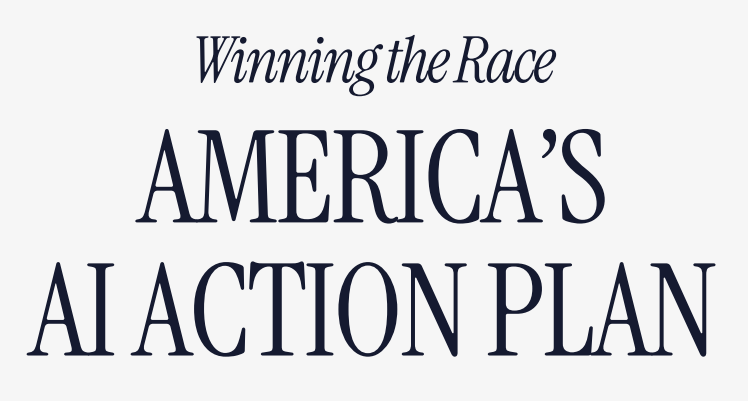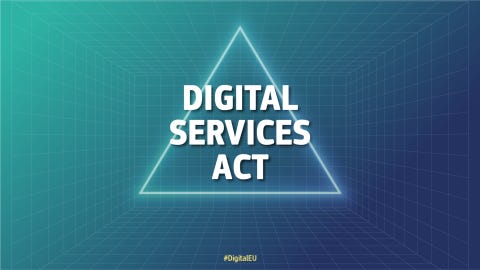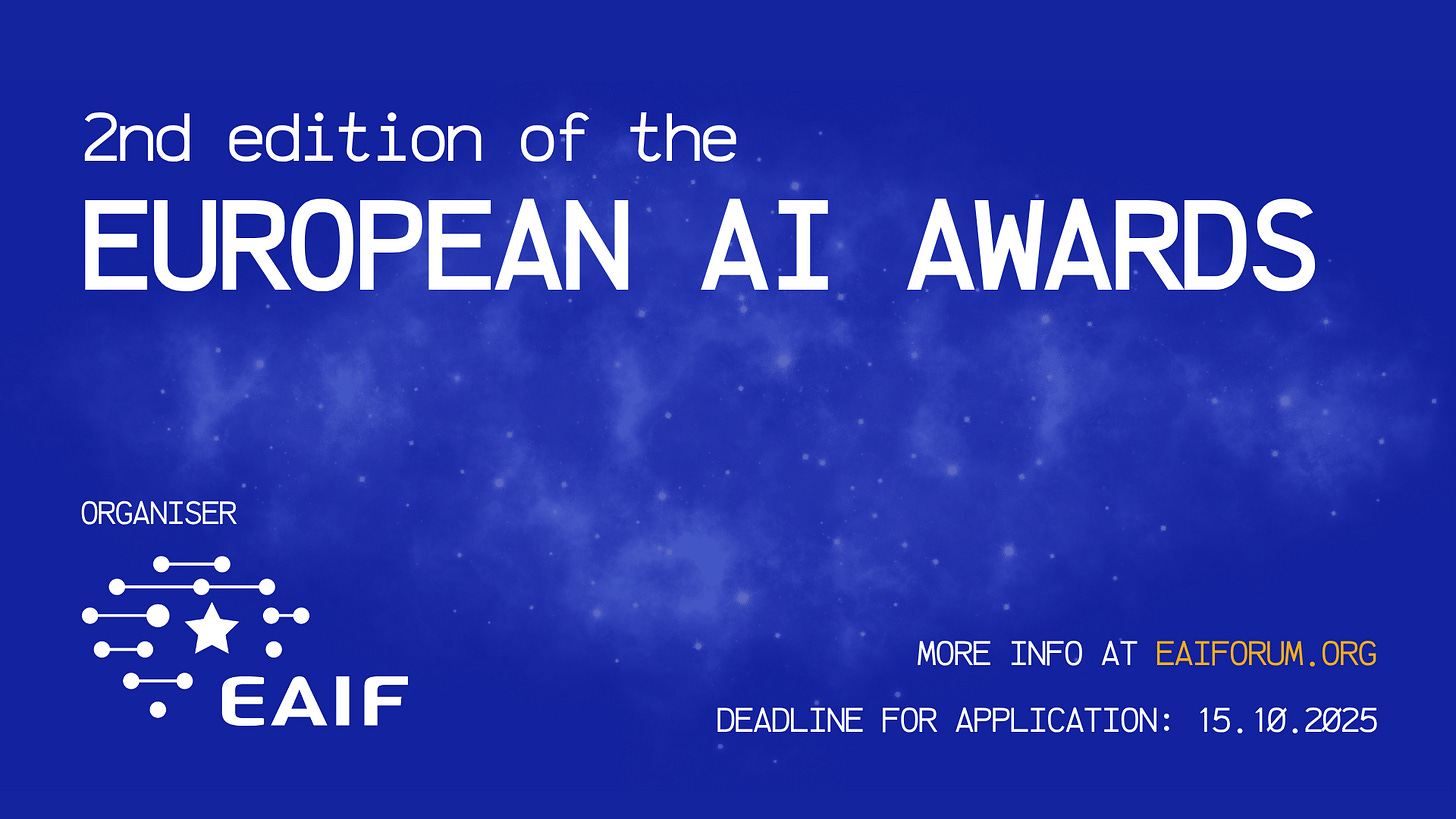EAIF newsletter
European AI Forum (EAIF) newsletter provide you on a monthly basis with insights, news and updates from the European AI ecosystem. AI regulation and EU policy, national AI activities, upcoming events.
In this 2025 July newsletter you can find the following topics:
Reactions to America's AI Action Plan
Data access for researchers who fulfil certain conditions can request access to data from very large online platforms
State of the Digital Decade 2025 report
Call for submissions for 2nd European AI Awards
Updates from EAIF member countries
Editor's Picks:
Reactions to America's AI Action Plan
The recently announced US AI Action Plan has sparked concerns in Europe over its geopolitical and economic implications. Rather than fostering open collaboration, the plan introduces an “AI export package” model—offering full-stack AI systems (infrastructure, software, data, and security) where control remains with the US supplier. This approach, critics argue, mirrors Cold War–era spheres of influence, creating technological dependence rather than empowering partners. The rhetoric explicitly aims to “secure continued US technological dominance”, sidelining the concept of digital sovereignty for allied nations. Robert Nogacki argues that Europe's AI regulatory strategy, relying on the "Brussels Effect," has failed by prioritizing compliance over performance, ultimately undermining European innovation and pushing global AI leadership toward the U.S. and China. For Europe, which lacks sovereign GPUs, cloud stacks, and large-scale AI ecosystems, this model risks locking the continent into a dependency loop while preventing the growth of its own AI sector.
Key points highlighted by Piotr Mieczkowski:
Export packages as tools of control – end-to-end solutions keep recipients dependent on US updates, licenses, and infrastructure.
Colonial language and standards – the plan frames AI adoption as a means to impose American governance models worldwide.
Suppression of local innovation – closed systems limit domestic R&D and transfer value to the supplier nation.
Geopolitical divisions – the world risks fragmenting into technological blocs dominated by competing empires (US vs. China).
Energy bias – the plan favors fossil fuels over renewable energy sources for data centres, reinforcing outdated energy dependencies.
Data access for researchers who fulfil certain conditions can request access to data from very large online platforms
The European Commission has adopted a delegated act on data access under the Digital Services Act (DSA), granting qualified researchers unprecedented access to the internal data of very large online platforms (VLOPs) and search engines (VLOSEs) to study systemic risks in the EU. Published on 2 July 2025, the act sets clear procedures for data sharing, vetting, and documentation, and will be supported by a new DSA Data Access Portal enabling researchers to apply and exchange with platforms and regulators. Researchers must undergo a vetting process by Digital Services Coordinators, demonstrating independence, secure data handling, and a commitment to publish findings. Following a three-month scrutiny period, the rules will enter into force later this year, with the first vetted researchers expected to gain access by October 2025—marking a major step toward transparency and safer online environments in Europe. The online marketplace made a number of binding commitments regarding access to public data for researchers:
A commitment to enable researchers who meet the criteria set out in Article 40(12) of the Digital Services Act to independently access and use public data to analyse systemic risks via automated means, such as ‘data scraping’.
A commitment to maintaining a dedicated API, allowing eligible researchers to retrieve and download relevant data.
A commitment to make customised datasets available to eligible researchers upon request.
A commitment to maintain a webpage providing relevant information on data access for researchers.
The State of the Digital Decade 2025 report by the European Commission warns that the EU must step up efforts to meet its 2030 digital transformation goals. While progress has been made in areas like AI adoption and digitalisation of public services, significant gaps remain: fibre and 5G standalone deployment is behind schedule, only 55.6% of Europeans have basic digital skills, and advanced ICT expertise—especially in cybersecurity and AI—remains scarce, with a marked gender imbalance. The report also flags Europe’s continued dependence on non-EU service providers and fragmented regulations as risks to technological sovereignty. To close these gaps, the Commission calls for renewed public and private investment, better access to venture capital, and coordinated action to build a secure, competitive, and digitally sovereign Europe.
The G7 has launched the GovAI Grand Challenge, an ambitious initiative aimed at accelerating AI adoption in the public sector to improve services, boost efficiency, and uphold transparency and fairness. Announced at the G7 Leaders’ Summit in Alberta, the challenge will feature Rapid Solution Labs to overcome barriers to public sector AI use, alongside the creation of the G7 AI Network (GAIN) to scale successful projects and share open-source AI solutions. Ministers will also explore strategic investments in large language models and digital infrastructure. The G7’s commitment emphasizes AI’s potential to enhance prosperity and address global challenges while tackling issues like energy demand, workforce transitions, and inclusion, with a strong focus on STEM education and increasing women’s representation in AI.
Call for submissions for 2nd European AI Awards
🚀 The European AI Forum is thrilled to announce the call for applications for the 2025 European AI Awards! Following the success of the inaugural awards, this year’s edition will once again spotlight the brightest innovators, investors, policymakers, and ecosystem builders shaping Europe’s AI future. Applications are open from June 1st to September 31st, 2025, with winners to be revealed at the 12th EAIF Conference in December. If your work is transforming the AI landscape across business, policy, investment, or research, now is the time to apply and be recognised!
Updates from EAIF member countries
Austria:
Support for AI workflows. ASC will offer advanced HPC resources, data analytics and AI training to help Austrian researchers develop AI models.
BilAI Summer School & AIRoV 2025. From 7‑11 July 2025, the University of Klagenfurt hosted the BilAI Summer School and AIRoV 2025 AI‑and‑Vision symposium, bringing 43 doctoral students to work on “bilateral AI” that combines symbolic (logic‑based) and subsymbolic (machine‑learning) approaches.
Bulgaria:
Teachers trained on AI tools. A Bulgarian digital‑skills academy trained more than 600 teachers in using AI tools, critical thinking and digital literacy to prepare pupils for the AI era.
Survey shows limited awareness of AI regulations. A study of 3,200 SMEs across CEE found 54 % of Bulgarian SMEs see economic benefits from AI, but only 28 % understand EU regulations; this gap will be addressed at the Digital Horizons forum
New AI factory. The EuroHPC Joint Undertaking chose Bulgaria to host one of six European AI factories; the Bulgarian “BRAIN++” factory will include a Discoverer++ supercomputer and an AI hub to build language models and robotics
Czech Republic:
State ban on DeepSeek AI app. Czech cybersecurity agency NÚKIB warned that Chinese AI firm DeepSeek could allow Beijing to access state data; the government banned the app from official devices due to security risks.
TopK’s €4.6 m seed round. EU‑Startups reported that TopK raised €4.6 million to build an AI‑native search engine that combines vector search with keyword matching; the platform aims to become a unified query layer for AI‑era applications
AI weeding startup Ullmanna. A European Commission case study featured Czech startup Ullmanna, which uses AI‑powered cameras to distinguish crops from weeds and control mechanical weeding machines; its strategic management of intellectual property helped reduce herbicide use and scale the technology
Croatia:
Dubrovnik Forum AI panel. The New Frontier Foundation organised a high‑level panel “How AI Can Enhance European Competitiveness” at the Dubrovnik Forum (11‑12 July 2025) to discuss leveraging AI for innovation, implementing the EU AI Act and fostering public‑private collaboration; panelists included Justice Minister Damir Habijan, Orbico’s Stjepan Roglić, Google’s Cezara Panait, Mastercard’s Hendrik Bourgeois and Prof. Mihael Mudrić
Data‑protection fines. The Croatian data‑protection authority imposed fines totalling €350,500 after personal data of over a million vehicle owners leaked; regulators found inadequate data protection and retention measures
France:
Macron calls for UK‑France AI alliance. During a state visit to London on 9 July 2025, President Emmanuel Macron urged Britain and France to pool talent, laboratories and finance to catch up with U.S. and Chinese AI leaders, arguing the two countries should “create a European alternative”
Sovereign AI tools for schools. The France 2030 programme launched a call for projects to develop sovereign AI tools to support teachers, with deployment from the 2026 school year
Pooling talents and research. Macron’s call emphasised pooling talents and research capacities between Britain and France to remain competitive and avoid “losing the AI revolution”
Germany:
AI‑driven economic offensive. Germany’s government unveiled a strategy to generate 10 % of its GDP from AI by 2030, including building “AI gigafactories” with EU funding by 2027 and linking AI research with robotics, mechanical engineering and car manufacturing
Support for defence start‑ups. Germany will cut red tape and triple defence spending to €162 billion by 2029, supporting start‑ups developing AI‑driven defence technologies such as cyborg cockroaches and robot tanks
Machine‑vision focus. MVPro Media reported that Germany’s €5.5 billion national AI strategy prioritises machine‑vision systems and aims to build AI processing centres and invest in quantum computing; the plan has phases covering strategy approval, construction of centres and scaling industrial AI
ChatGPT adoption and investment. OpenAI’s Nick Turley noted that Germany is among the top three nations for paying ChatGPT subscribers and top four in business use; ChatGPT opened its first German office in Munich, and Bosch announced a €2.5 billion AI investment focusing on automated driving and quality checks
Skills shortages acknowledged. The CEDEFOP article noted that Germany faces a shortage of AI‑capable skilled workers, citing a 2024 OECD report, and stressed the need to attract more students and equip employees with AI skills
Lithuania:
AI and geopolitics conference. On 8 July 2025 the Ministry of Foreign Affairs hosted an international conference in Vilnius titled “AI and Global Power: Regulation or Reliance?” examining AI’s geopolitical impact and the U.S.
NVIDIA‑powered AI platform. VILNIUS TECH unveiled a new AI platform built on an NVIDIA DGX B200 server costing over €1 million;
Traxlo’s €1.6 m raise. Traxlo secured €1.6 million to expand its “pay‑per‑task” labour infrastructure using AI agents to automate task creation and quality checks;
Netherlands:
AI Lab improves medical imaging. Utrecht University’s AI Lab for Imaging and Image‑Guided Interventions developed tools that convert MRI scans to CT, automatically outline organs for radiotherapy and integrate with the MR‑Linac device; these innovations cut treatment times from 45 to 30 minutes and save staff time
Poland:
Poland leads generative‑AI adoption. A report by Human+AI Institute and CampusAI found that 63 % of Polish respondents actively use generative‑AI tools—more than in the USA (41 %), UK (48 %) or Spain (40 %)
Plan for Baltic AI Gigafactory. Poland announced plans to build a €3 billion Baltic AI Gigafactory with Estonia, Lithuania and Latvia to manufacture advanced hardware for AI infrastructure
Government AI investment. To boost adoption, the government pledged PLN 1 billion to AI projects and introduced a Polish Large Language Model (PLLuM) in February 2025 with Google as a partner
Micro‑business hesitation. The Polish Economic Institute report noted that more than half of micro and small firms do not plan to invest in AI in the next three years, highlighting a significant adoption gap
Slovenia:
Upgrade to Vega supercomputer. The Slovenian AI factory will upgrade the country’s existing Vega supercomputer, enhancing computational capabilities for AI and HPC
Have news to share: newsletter@eaiforum.org
Contact: info@eaiforum.org
Website: eaiforum.org
LinkedIn: linkedin.com/company/eaiforum






